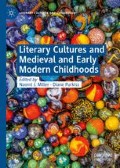Abstract
What stories were made available to early modern children at school and at home? Catherine Belsey considers how the upbringing of early modern children equipped them to reshape their culture for a new generation. Although the grammar school offered a harsh environment for little boys, the Latin curriculum included Aesop’s fables, which would reappear transformed in the work of the adult Spenser, Marlowe, Shakespeare and Ben Jonson. Ovid, also taught at school, was everywhere reinvented in early modern writing, while Virgil provided the model for tales of heroic adventure. Girls would generally encounter these authors at one remove, but Aesop was also marketed in translation for reading by the family hearth—with pictures—as were Chaucer and Reynard the Fox. Popular romances, too, were abridged as holiday reading for the young. And alongside all this, old wives were assigned the task of keeping alive the oral tradition of fireside tales, which were also put into print for a few pence in broadside ballads. Meanwhile, the chapter demonstrates that the educational discipline of translation encouraged an awareness of connotation that must go some way to explain the period’s extraordinary output of writing in English.
Access this chapter
Tax calculation will be finalised at checkout
Purchases are for personal use only
Bibliography
Aesop. 1976. The History and Fables of Aesop. London: Scolar Press.
Artese, Charlotte. 2015. Shakespeare’s Folktale Sources. Newark: University of Delaware Press.
Baldwin, T.W. 1944. William Shakespeare’s Small Latine & Less Greeke. Vol. 1, 2 vols. Urbana: University of Illinois Press.
Belsey, Catherine. 2007. Why Shakespeare? Basingstoke: Palgrave Macmillan.
———. 2011. “William and Geoffrey.” In Shakespeare Without Boundaries, ed. Christa Jansohn, Lena Cowen Orlin, and Stanley Wells, 175–188. Newark: University of Delaware Press.
Bennett, H.S. 1965. English Books & Readers 1558–1603. Cambridge: Cambridge University Press.
Blakemore Evans, G., et al., eds. 1974. The Riverside Shakespeare. Boston: Houghton Mifflin.
Burrow, Colin. 2013. Shakespeare and Classical Antiquity. Oxford: Oxford University Press.
Caxton, William. 1477. The Histories of Jason. Westminster: W. Caxton.
Coleman, Joyce. 1996. Public Reading and the Reading Public in Late Medieval England and France. Cambridge: Cambridge University Press.
Cooper, Helen. 2010. Shakespeare and the Medieval World. London: Bloomsbury.
Drayton, Michael. 1953. “To My Most Dearely-Loved Friend Henery Reynolds Esquire, of Poets and Poesie.” In Poems of Michael Drayton, ed. John Buxton. London: Routledge and Kegan Paul.
Enterline, Lynn. 2012. Shakespeare’s Schoolroom: Rhetoric, Discipline, Emotion. Philadelphia: University of Pennsylvania Press.
Hackel, Heidi Brayman. 2005. Reading Material in Early Modern England. Cambridge: Cambridge University Press.
Hillebrand, H.N. 1926. The Child Actors: A Chapter in Elizabeth Stage History. Urbana: University of Illinois Press.
Ingelend, Thomas. 1970. The Disobedient Child. New York: AMS Press.
Jonson, Ben. 1999. Volpone. Edited by Brian Parker. Manchester: Manchester University Press.
Langham, Robert. 1983. A Letter. Edited by R.J.P. Kuin. Leiden: E. J. Brill.
Marlowe, Christopher. 1968. Dido, Queene of Carthage and The Massacre at Paris. Edited by H.J. Oliver. London: Methuen.
Montaigne, Michel de. 1910. The Essayes of Michael Lord of Montaigne. Translated by John Florio. Vol. 1, 3 vols. London: J. M. Dent.
Nice Wanton. English Moral Interludes. 1976. Edited by Glynne Wickham, 143–162. London: Dent.
Peele, George. 1980. The Old Wives Tale. Edited by Patricia Binnie. Manchester: Manchester University Press.
Puttenham, George. 2007. The Art of English Poesy. Edited by Frank Whigham and Wayne A. Rebhorn. Ithaca, NY: Cornell University Press.
Schell, Edgar T., and J.D. Shuchter, eds. 1969. English Morality Plays and Moral Interludes. New York: Holt, Rinehart and Winston.
Shakespeare, William. 2011. The Arden Shakespeare Complete Works. Edited by Richard Proudfoot, Ann Thompson, and David Scott Kastan. London: Bloomsbury.
Sidney, Philip. 1989. The Defence of Poesy. Sir Philip Sidney. Edited by Katherine Duncan-Jones. Oxford: Oxford University Press.
Spufford, Margaret. 1981. Small Books and Pleasant Histories. London: Methuen.
Thompson, Ann. 1978. Shakespeare’s Chaucer: A Study in Literary Origins. Liverpool: Liverpool University Press.
Tilley, Morris Palmer. 1950. A Dictionary of the Proverbs in England in the Sixteenth and Seventeenth Centuries. Ann Arbor: University of Michigan Press.
Walsham, Alexandra. 2002. “Reformed Folklore? Cautionary Tales and Oral Tradition in Early Modern England.” In The Spoken Word: Oral Culture in Britain, 1500–1850, ed. Adam Fox and Daniel Woolf, 173–195. Manchester: Manchester University Press.
Williams, Deanne. 2014. Shakespeare and the Performance of Girlhood. Basingstoke: Palgrave Macmillan.
Author information
Authors and Affiliations
Editor information
Editors and Affiliations
Rights and permissions
Copyright information
© 2019 The Author(s)
About this chapter
Cite this chapter
Belsey, C. (2019). The Tudor Schoolroom, Antique Fables, and Fairy Toys. In: Miller, N.J., Purkiss, D. (eds) Literary Cultures and Medieval and Early Modern Childhoods. Literary Cultures and Childhoods. Palgrave Macmillan, Cham. https://doi.org/10.1007/978-3-030-14211-7_4
Download citation
DOI: https://doi.org/10.1007/978-3-030-14211-7_4
Published:
Publisher Name: Palgrave Macmillan, Cham
Print ISBN: 978-3-030-14210-0
Online ISBN: 978-3-030-14211-7
eBook Packages: Literature, Cultural and Media StudiesLiterature, Cultural and Media Studies (R0)

